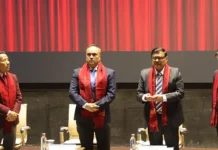[Bengia Ajum]
ITANAGAR, 20 Oct: In a highly controversial move, the state government has issued an order which is being seen as an attempt to gag the voice of the employees working under it.
This comes at a time when the APPSC paper leak case has caused a massive uproar, leading many, including government employees, to voice their opinions.
In a ‘memorandum’ issued on 19 October, the chief secretary cited Rule 9 of the CCS (Conduct) Rules, 1964 to justify the move to issue the memorandum to the employees.
Stating that it has come to its notice that “some government employees are indiscriminately voicing their opinions, including adverse statements/criticism against the government in social/print media,” the government drew their attention to Rule 9 of the CCS (Conduct) Rules, 1964.
As per this rule, “no government servant shall in any radio broadcast, telecast through any electronic media, or in any document published in his own name or anonymously, pseudonymously, or in the name of any other person or in any communication to the press or in any public utterance, make any statement of fact or opinion which has the effect of an adverse criticism of any current or recent policy or action of the central or the state government.”
“The government employees cannot make a statement which is capable of embarrassing the relations between the central government and the government of any state or which is capable of embarrassing the relations between the central government and the government of any foreign state,” the memorandum read.
Further, the government said that “such behaviour without permission is unbecoming of government servants and is liable for disciplinary action.”
“Hence, it is hereby ordered to exercise caution while expressing themselves in any social media which otherwise may invite disciplinary proceedings under CCS (CCA) Rules, 1965,” the memorandum read.
The move has drawn sharp reactions, with many government employees terming it an attempt to gag their voice.
“Some of the aspirants who are strongly voicing against the assistant engineer paper leakage case are government servants working as junior engineers. This might be an attempt to silence their voices,” said an aspirant, speaking to this daily.
A government employee, who did not wish to be named, said that freedom of expression is a fundamental right given to the citizens of India, and that government employees are also citizens of India who cannot be denied this fundamental right.
“These service rules are British era rules under autocratic rules of the British Indian government. Now India is a free country and therefore these CCS rules are redundant. The continuation of these rules is contrary to the democratic philosophy of the Indian constitution,” the employee said.
He further said that a government servant cannot say yes to a wrong government policy which is not for the welfare of the people who the government employees are supposed to serve.
Another government servant also strongly spoke up against the government’s order.
“A government servant, before being anything else, is but a citizen of this country, endowed with certain rights guaranteed and protected by the Constitution, freedom of speech and expression being one such. Also, in the same CCS (Conduct) Rules, 1964, Rule Number 8, Sub-Rule 3 reads: “A government servant publishing or participating in a public media shall at all times make it clear that the view expressed by him are his own and not that of the government,” he said.
“Any comment or criticism by a government servant, as or in the capacity of concerned, responsible and responsive citizen, is or should be allowed as the government policies affect every sphere of our lives. Among many examples, the inflation and price rise in recent years equally hurt the government servants and their families. In such situation, one is helpless but to criticise the government’s policies on such matter, but only as a citizen,” he said.
In 2020, in a historic judgment, the Tripura High Court ruled that government servants have the right to free speech. The high court had set aside the suspension of an upper division clerk, who had not only campaigned for a political party but spoken against a leader in a public rally and made a politically motivated post on Facebook.
“Government employees shall always be governed by the said restriction for discipline and efficiency of the administration, but at the same time, these restrictions cannot be used in such a manner that can be treated as a complete ban on freedom of expression or association,” the HC ruled in its order.


